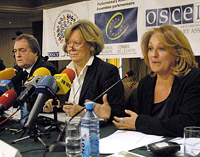“The February 19 presidential election in the Republic of Armenia was administered mostly in line with OSCE and Council of Europe commitments and standards,” the preliminary findings of the main international vote-monitoring mission jointly deployed in Armenia by the OSCE, the Council of Europe and the European Parliament read. The OSCE/ODIHR observation mission released the preliminary evaluation of the presidential election. The report was positive in general especially if you compare it with the report of the same organization about the presidential elections 2003. Let’s remember that the heads of the observation mission of the OCSE ODIHR Peter Eiker and Lord Russel Johnston game quite strict remarks on the second round of the presidential elections 2003. Eiker stated that he’s disappointed and Johnston said that he is not desperate but he’s disappointed. This time the international monitors didn’t give such strict assessment on the elections despite the fact that several presidential candidates didn’t accept the results of the elections and there are numerous publications about the electoral violations and falsifications in the media. Moreover, this time the international observers in their report equaled the law-enforcing bodies of Armenia – the police, prosecutor’s office, who on the election day were denying the electoral violations on the voting day. The report stressed that the 400 or so mostly Western observers found no major irregularities in “a large majority” of polling stations visited by them on Tuesday. But it said at the same time that the Armenian authorities have failed to address chronic problems such as a lack of “equal treatment of election contestants” and Sargsyan’s heavy reliance on his government levers. “The conduct of the count did not contribute to reducing an existing suspicion amongst election stakeholders,” the observers said, adding that the process was assessed as “bad” or “very bad” in 16 percent of polling stations visited by them. “Some of our observers had very bad experiences during the vote count,” said Anne-Marie Lizin, a senior Belgian lawmaker representing the OSCE Parliamentary Assembly. However, Head of the OSCE Parliamentary Assembly also pointed out that “Additional legal amendments are required for neutralizing the challenges which have not yet been overcome. In this context, it is necessary to distinguish the functions of the authorities and the parties, to eliminate the people’s distrust of electoral processes. Neither did this time the tabulation of the election results reduce the level of doubt among the interested parties, although the choice was really made among real political alternatives. The freedom of rallies and campaign meetings was mainly guaranteed. The Prime Minister had advantage during the campaign since he continued officiating, although this is not prohibited by law.” However, the monitors positively estimated the turnout of voters. Mrs. Lizan said that they have compared the voter turnout in Armenia with the Africa, where in certain precincts there was a 100% turnout. She also encouraged the Armenians to quickly resolve the conflict with Azerbaijan and establish relations with Turkey. After the observers had presented the report they started to answer the questions of journalists. Will the preliminary report differ much from the final one as did in Georgia. The observers gave a shunning answer to this question. “We are not saying that the elections fully conformed to international standards. We are saying mostly in line,” said the head of the Pace observation mission John Prescott. He also emphasized that there are certain issues with the ballot re-count and noted that this is a preliminary statement. Prescott also added that they are concerned about the fact that the participants of the elections are appealing the results of elections. He expressed an opinion that the further process will be transparent and added, “We never comment on the results. We comment on the process.” Yesterday at noon when the international observers were reading their report Levon Ter-Petrosyan was holding a rally near the Matenadaran. The participants of the rally marched to the Republic Square and walked to Nalbandyan street and to Liberty Square. As informed by Guert Arens, a German diplomat heading this group, they carried out long-term observation missions in separate groups and in different provinces of the country from 7 till 14 January. “Our preliminary statement will be replenished and finalized in 20 days’ time when we will also have data on how the existing electoral disputes were resolved. There are many other circumstances that need additional discussion as well. I don’t think the assessments may change in the final report, because our current assessment results from the joint discussion of the 4 international organizations. 70 percent participation of the people is the best evidence that the voters were interested in the votes they cast.” NA MP, members of the Heritage faction Vardan Khachatryan, who was present at the press conference, stated that he was not satisfied by that report and expects more objective assessment. A little later, during the rally Ter-Petrosyan stated that the assessment of the European observers create favorable conditions for them. “This is serious politics and I know my job,” he said.

